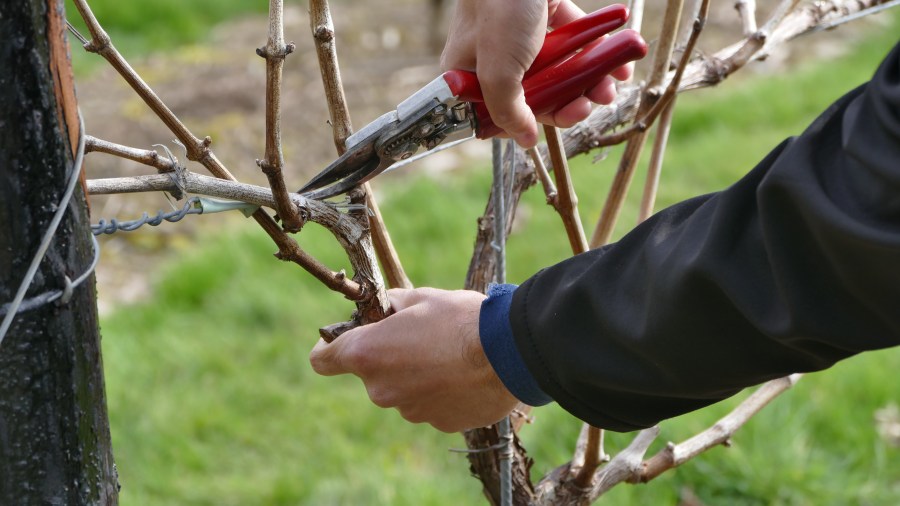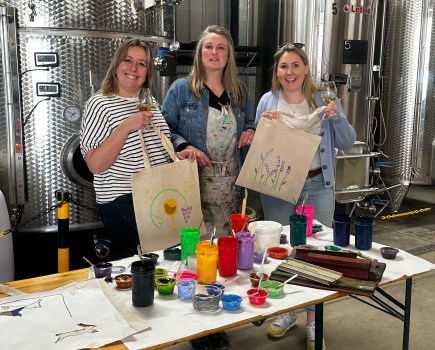On 8 March 2019, viticulturists gathered at Hush Heath Estate in Staplehurst, Kent, to battle it out at the UK’s first vine pruning competition.
Those readers who have attended a ploughing match in the past will know the sheer delight of seeing an industry come together for a bit of friendly rivalry, while also being able to catch up with fellow growers and suppliers, and enjoy a well-earned day off the farm.
The brainchild of Stephen Skelton, industry consultant and chair of Wines of Great Britain’s (WineGB) Viticultural Advisory Group, the pruning competition follows a tradition found in many other major wine growing regions around the world
“I have had this idea in mind for about five years,” said Stephen Skelton, MW. “There is a lot of emphasis placed on winemakers, who usually get all the glory as the ‘rock stars’ of the wine world, but it’s the viticulturists, the ‘roadies’, that supply the grapes and you don’t get great wine unless you have great grapes. Pruning is the most important vineyard task of the year and you don’t get a long-term, sustainable, good yielding vineyard unless pruning is done correctly and efficiently.”
Organised by James Dodson at Vine Works; Tony Purdie, vineyard manager at Yotes Court; and the team at WineGB HQ, the oversubscribed match saw 12 teams of three people from Chapel Down, Davenport, Gusbourne, Hush Heath, Rathfinny, Ridgeview, Vine Works Valka, Viti Labour and Yotes Court, go head-to-head for the coveted Champion Team Trophy, which was hand crafted by Billy Turner, Hush Heath’s assistant estate manager, from one of the first vines planted there in 2002.
Each competing team was given a single bay of five vines to prune, pull out and tie down, being judged for proficiency, accuracy and speed in the process. Led by Tony Purdie, the judging panel included consultant Duncan McNeill, Paul Tuteirihia, from NAIB EMR, and Vincent Burgat from secateurs manufacturer Felco, who has previous experience of being involved with pruning competitions all over the world and flew over from Switzerland specially for the occasion.
“It was all judged blind to keep things fair,” said Duncan McNeill, owner of McNeill Vineyard Management. “We all had different criteria to assess; I reviewed cane and spur selection, Vincent was looking at cutting technique, and Paul examined cane tying and trimming. There was a separate group timing the competitors, but speed only equated to one tenth of the overall score; it was definitely not just a race against the clock.”
Scoring 74 out of a potential 100 points, Davenport’s team, Phil Harris, Ben Connor and Tom English, were crowned the overall winners. As well as being the quickest, finishing their bay in just five minutes and 47 seconds, judges highlighted their consideration of the current year’s yield and ability to maintain the long-term future shape and productivity of the vine. The cutting technique was also praised, with excessive bud sites having been correctly cut flush to allow an open head to be maintained without excessive renewal growth.
“You never really know how you compare to other vineyards, so it was a nice surprise to win,” said Phil Harris, vineyard manager at Davenport. “It is Tom’s second year of pruning, Ben started around six years ago and I have been pruning at Davenport since 2007. I was very lucky to work with Marcus Goodwin who taught me everything I know. Both Ben and I have completed quite a few years of pruning and while we were happy with the speed, we weren’t expecting to win because we didn’t think it was the best job we’d ever done. We were really stoked and it was nice to have a day out too.”
As well as taking home the trophy, Davenport were also awarded £200 and a Felco goody bag for each member of the team, which included Felco 8 Secateurs, a holster, a saw and a diamond coated sharpener. In second place, winning Felco goody bags and £100, was Gusbourne’s first team, with third place being awarded to Vine Works Valka, who took home £50 and Felco goody bags also.
“I was really impressed with the enthusiasm shown by all the contestants and there was a great mix of managers, full time vineyard staff and contractors,” said Tony Purdie. “We were trying to ignite a friendly competition to affirm that pruning is a technical skill and an immensely important element in the pursuit of quality wines and healthy vineyards. It might look easy, but even for those with years of experience, pruning in a competition is quite intimidating especially with onlookers and judges ready to critique your work.”
Alongside a nominal entrance fee, the event was generously sponsored by vine post suppliers, Hadley Group, vineyard equipment manufacture, Gripple, and Felco, who were supported by UK agent NP Seymour, and as well as facilitating some impressive prizes, post-match competitors and team supporters were able to catch up and relax over a pint, supplied by Bedlam Brewery, and a hog roast.
While the competition was organised to celebrate the industry’s talented and hardworking vineyard technicians, it is also hoped that the results of the competition will help to promote industry wide improvement, as any reoccurring faults can be easily identified and addressed.
“Speaking to the other judges, I think there would now be scope to host a pruning conference to look at the best techniques for UK conditions,” said Tony. “There were some common themes appearing, such as unwanted canes not being cut flush, basal buds being left, which causes shoots to grow out, and a lot of spurs could have been in a better position. It was also clear that people were feeling the pressure for time and made rash decisions; you need to be considerate, but you also need to be able to prune at a viable cost. It was a really successful day and now we can talk about the key issues and how to fix them.”
Next year’s event will be held in a different location, possibly somewhere in Hampshire, and organisers, revelling in the success of the inaugural match, also suggested that there would be a more developed range of competition classes such as under 21s, individuals, over 70s, all male and all female teams.




